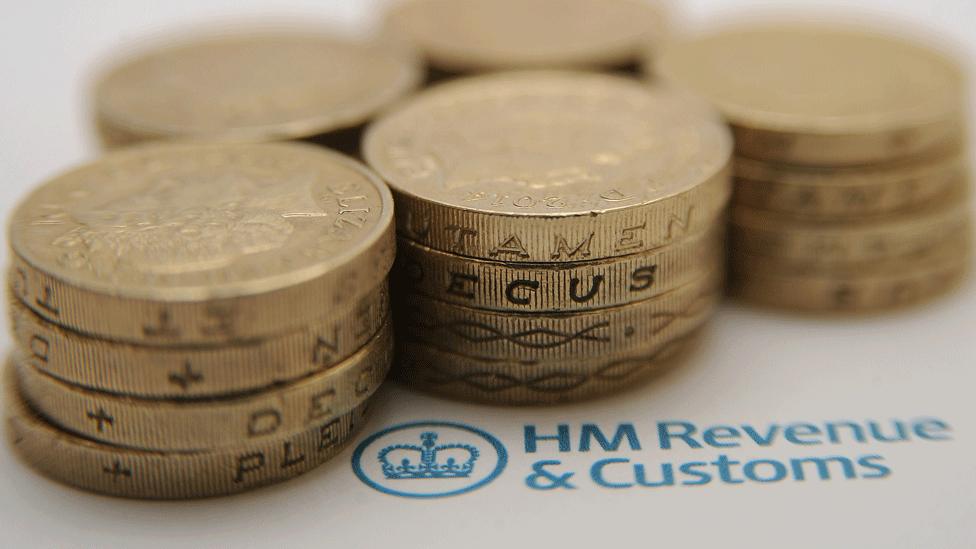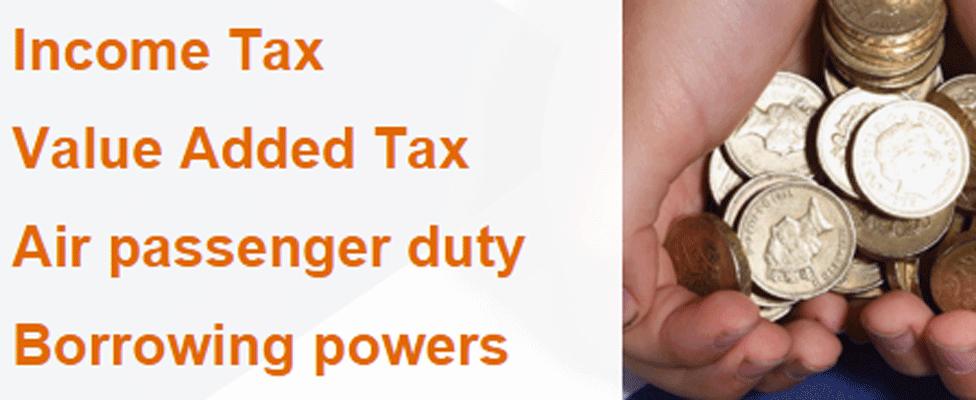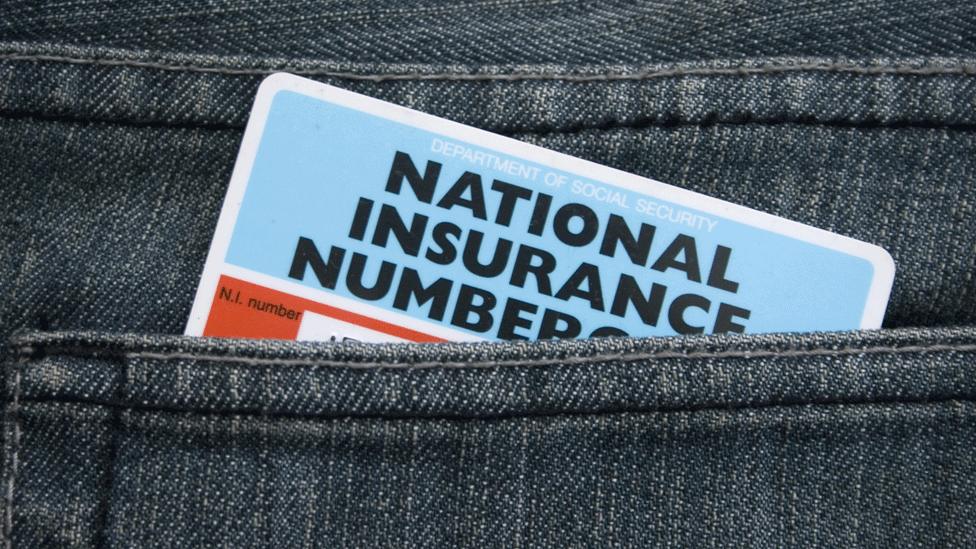Scotland's tax powers: What it has and what's coming?
- Published
New tax raising powers are heading to Scotland, but what are they going to be and what does the country already have?

What tax powers did Scotland get in 1999?

For nearly 17 years the Scottish Parliament has been able to vary income tax 3p up or down. That was a blunt instrument, and it hasn't been used.
But if we go back to 1999, and the first election, the SNP did campaign for a 1p increase in tax, to pay for public services in Scotland, and to ease the squeeze in spending then.
It found it's a hard campaign to fight, external, particularly if you don't put in the groundwork, and it contributed to a pretty difficult election campaign. The SNP has not gone back to that tax power, but argued for more extensive powers.
There are other Holyrood tax raising power;
£2.8bn from business rates. It has tracks precisely the rate set at Westminster, with some reliefs for smaller businesses, and some less welcome levies on certain big businesses, such as supermarkets. However, there's a lot of pressure to reform business rates.
£2bn from council tax. It's been frozen for eight years, and there's a lively debate about whether that has been wise, or whether it's sustainable.
Both of these taxes could have been ripped and started again. But it's very difficult to do so, because if there's any point to tax reform, there will be those who gain and some who lose. Politicians always hear more from those who lose out.

What's changed since 1999?

Last April a new tax to replace stamp duty, called the Land and Buildings Transaction Tax, was introduced.
The Scottish government took the opportunity to load more of the tax burden on to those buying more expensive houses, and to reduce the burden on those with cheaper homes.
At Westminster, George Osborne copied an element of that reform with his own reforms of Stamp Duty. The Chancellor also made some changes which Scotland's Finance Secretary John Swinney felt he had to copy, including higher tax on buying a second home.
That shows that, for all the ability to diverge tax policy, there are pressures that mean it doesn't work out that way.
In April, there will be a Scottish Rate of Income Tax. So, how will it work in practice;
Of the 20p now being paid from £1 of basic rate income (paid on earnings above £10,600 and up to £42,375) 10p of that is going to be levied by the Scottish Parliament.
That 10p amount could be varied up or down.
Mr Swinney is choosing not to change it, so assuming his Budget Bill, external passes, tax bills will look similar, but this does require MSPs to choose a tax rate for the first time.
It also forces them to change rates for each band at the same level. So on higher rate income, above £42,375, taxed at 40%, any change to the lower rate would have to be applied also to the higher rate.
That removes the ability to use the tax system to redistribute the tax burden from lower and middle earners to higher earners.

Why is there a reluctance to vary income tax?

Ministers have said they want a fairer tax system, and they've long argued for more tax levers. They say, in this case, that if they can't redistribute tax across these bands, then they're not going to change things.
First Minister Nicola Sturgeon said this was not progressive, as the powers are set out. At least one academic analysis suggests that's not quite right - that raising taxes by the same amount at every level hits higher earners harder.
But this is where ministers are heading into difficult political territory, because it's not easy to campaign for an election with a promise of higher tax.
And economically, there is a high risk that an increase in tax would not have the effects you might expect.
People are very sensitive to tax rates in how much they choose to earn, how they choose to earn it, and if they can, where they might choose to declare their income. Income is not as easy to tax as a house.
However, the SNP's opponents are putting forward plans to vary the Scottish Rate of Income Tax.
Scottish Labour says it should happen this April, adding 1p - to rise to 21p basic rate and 41p higher rate - and raising money "to protect public services". It claims it could give a rebate to those earning less than £20,000. Labour can be expected to say something similar in its Holyrood manifesto.
The Scottish Liberal Democrats want a similar increase, aimed at protection of education spending.
A Scottish Conservative-appointed commission argued that the total tax burden should not rise any higher in Scotland than it is in the rest of the UK. Under Ruth Davidson's leadership, it may argue for an SRIT tax cut after the May election. Or it could propose some tinkering with the bands. Its commission proposed an intermediate banding, of perhaps 30p, for a tranche of earnings between the standard and higher rates.

Aren't there even more powers going to Holyrood?

Again there is a focus on income tax where more flexibility is set to be introduced. The thresholds for each band of income tax can be changed, and the rates at which they're taxed can vary.
The new Scotland Bill, external also means that half of VAT raised in Scotland will be passed to the Scottish parliament. (It's not possible, under European Union law, for one member state to vary VAT within its boundaries.)
Air Passenger Duty is also being devolved - the SNP wants to cut that in half, over time but Labour is critical of that idea.

Are there things Holyrood can't do?

What it cannot do is alter National Insurance and VAT, which are the two big sources of revenue, along with income tax. What it can do is alter the way that income tax is raised, with bands and rates. That means power over raising more than £10bn at current levels of revenue.
So MSPs will be able to tinker all they want with income tax, but there are constraints.
It's worth remembering that those who earn in the top 1% pay more than a fifth of the income tax total. So you don't want to alienate them with punitive high rates.
That's linked to the constraint of tax competition. High earners are looking to where they can pay less tax, and they're often mobile. If Westminster taxes are cut, while Scotland's go up, or even stand still, there's an incentive to move.
On the issue of welfare powers, the changes are limited to "topping up" rather than allowing for radical reform.
One of the significant tax powers that is not included is Corporation Tax, levied on the profits of companies. That offers levers for finance ministers around the world to compete with other countries. Compared with similar developed countries, Britain now has relatively low corporation tax.

Will Holyrood change as it gets more powers?

Holyrood will soon be responsible for;
about £5bn in income tax
nearly £3bn in business rates
and the system that delivers £2bn in council tax.
That requires scrutiny of the budget on spending and revenue, and scrutiny of forecasts. Ministers plan to do their forecasting in-house - a source of controversy - and that is full of uncertainties that MSPs will want to probe.
Therefore, we can expect them to be more responsive to tax payers, particularly when they make changes shifting the burden of tax to certain groups - mainly high earners.

Will the new tax set up deliver more or less for Scotland?

Well, income tax revenue is dependent on how much income people make, and that's related to growth in the economy.
Professor David Bell at Stirling University has looked at this, and warns that Scotland's growth is much more likely to underperform that of the rest of the UK than it is to grow faster.
And if the economy - along with the tax base - does not grow as fast, then the tax revenue won't grow as fast.
This puts a lot of pressure on ministers at Holyrood to get the economic growth rate up, and in recent months, that rate has not been looking good.

Will the block grant be adjusted?

That's a very thorny issue for now. It's easy enough to cut it by half of the income tax revenue expected next year. But it's the way it changes in subsequent years, and way off into the future, that could make billions of pounds worth of difference to the money available to the Scottish Parliament.
This is the Fiscal Framework, which is being hotly argued in private. We got some insight into the likely thinking from an expert in all this, Jim Gallagher, now at Oxford University.
He says one of the sticking points is likely to be that of population growth, if the number of people in Scotland continues to grow slower than in England.
One way of indexing the change in block grant each year could potentially mean that English taxpayers reward Scotland for growing more slowly, and it's suggested that may not look fair from south of the border.
It's fiercely complicated, and the Scottish government is warning that if it doesn't like the offer, it may simply block the next tranche of reforms completely.